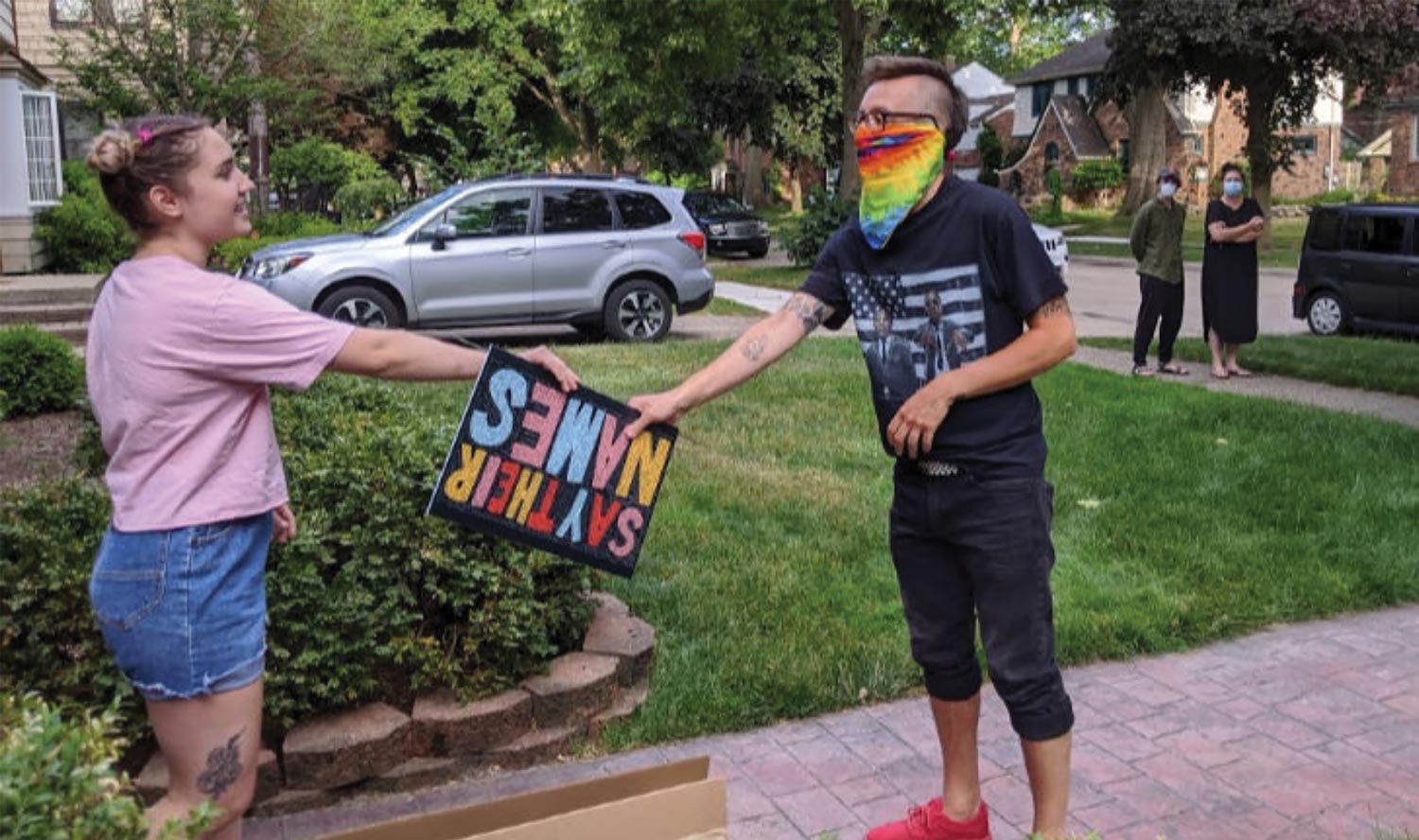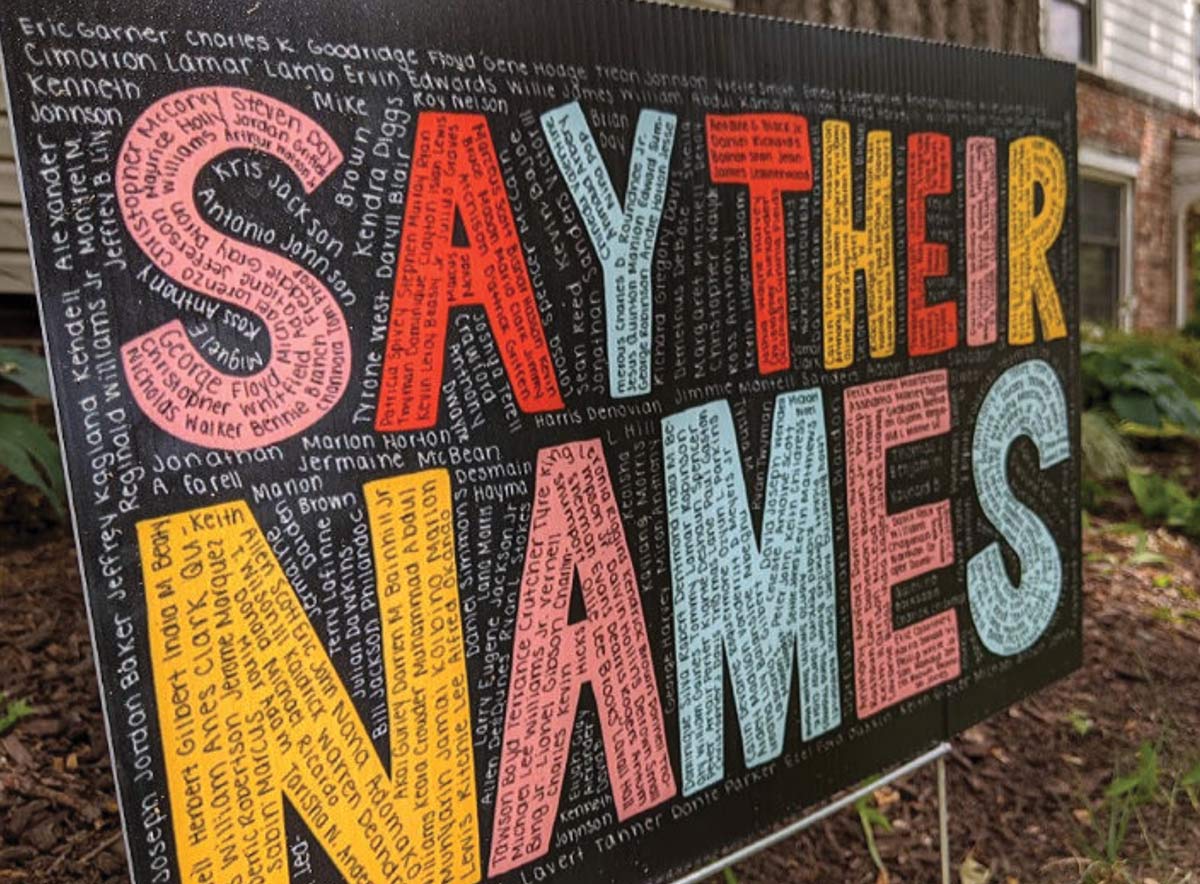
Christina Krysiak scrolled down her internet browser and read name after name after name of Black Americans who have been victims of police brutality. The 19-year-old Wayne State University art student was appalled. She wanted to do something to help, especially as her social media feeds filled with others getting involved with the Black Lives Matter movement.
Krysiak decided that her art would be the best platform to help make a difference. What started as designing stickers with the phrase “Say Their Names,” which she sold for $5 through a local Facebook group to raise money for Black Lives Matter, has since turned into hundreds of yard signs across her hometown of Pleasant Ridge, the surrounding area and some communities throughout the United States.
“I saw the list of all the names, and it was huge. You started to hear the phrase ‘Say Their Names’ everywhere, and I think some people were only thinking of Breonna Taylor and George Floyd,” Krysiak said. “But this goes back so far. I felt I was a little bit selfish if I didn’t use what I was good at — my art — to make my voice heard. I told myself: ‘I can do this. I want to do this. I need to do this.’
Written in bold, colorful letters against a black background, Krysiak’s design incorporates the “Say Their Names” phrase, which not only identifies victims of police brutality but also focuses on their individual humanity by using their names. Embedded throughout the sign are around 325 names of police brutality victims that date back to the early 2000s — nowhere near close to the total number, Krysiak said.
Krysiak, who applied to art schools across the country, chose Wayne State after hearing many positive things from former teachers and alumni about the art program. “My professors are all wonderful, and I feel very comfortable here,” said Krysiak. “I wanted to stay in the area, especially since Detroit has such a growing art scene.”
Krysiak said she wasn’t raised around social activism and credits two of her close friends, Emily and Orlaith, with getting her more involved and taking action. She participated in her first protest rally on June 6 in Ferndale and observed that it shows how willing everyone is to come together for this, particularly in the middle of a pandemic.
“When I’ve been trying to explain it to other people who might not fully understand the issue, whether family or friends, I keep going back to [the idea that] it’s not just about the recent police events. These are not things that just happened. It goes back centuries,” Krysiak said. “Even through my art history classes, we see the lack of representation of African American artists until just 100 years ago or so. It’s a systemic thing that has developed over time. And, unfortunately, those values that people had centuries ago have carried over to some of the population. We’re just going to try and weed them out now.”

Curtis Schabath, a 33-year-old Ferndale resident and marketing professor at Macomb Community College, was one of the dozen or so people who lined up on the sidewalk to purchase a sign. He found out about it through a Facebook page for Ferndale and surrounding area residents.
“We have to remember that this is not going anywhere. Changes have to be made, and we can’t forget. There are so many names and, unfortunately, will continue to be,” Schabath said. “As weeks go on, when some of the movement messages deteriorate and get lost, something like this is going to keep it out there en masse by putting it on hundreds of lawns in an area.”
This isn’t Krysiak’s first time using her artistic gift to make a bigger statement. Two years ago, at age 17, she was one of three artists whose designs were chosen for display by the Ferndale Arts and Cultural Commission for its community inclusivity mural contest. Her mural — three girls with paint splattered across their eyes — was part of a statement about the struggle women face with being judged. The mural is painted on the outside wall of the Cupcake Station, a local bakery on Nine Mile Road in downtown Ferndale.
“Individually, people need to start holding themselves and others more accountable. If you see something that’s not right, say something. Call them out,” Krysiak said. “People need to understand it’s not coming to a close now; ‘we had those few weeks of protests and everything is done.’ It’s not. It needs to be something that is sustained for longer. I hope my voice and art can help.”